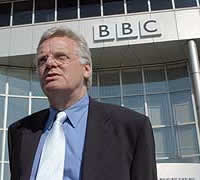 Developments in the last week at ITV have brought into focus the challenges the BBC faces in keeping alive Mark Thomson’s view of a 360 degree future where the BBC can dominate the UK media scene.
Developments in the last week at ITV have brought into focus the challenges the BBC faces in keeping alive Mark Thomson’s view of a 360 degree future where the BBC can dominate the UK media scene.
Grade will be a formidable figure, who can question the right the BBC has to be in on every new development and we can expect the issues around the BBC’s desire to launch British equivalents to Google and MySpace to be aired in sections of the UK press.
Following the double headed departure of Dyke and Davies after controversial reporting on the Government’s policy on Iraq, it was essential to restore normality to the ‘much loved institution’ and Michael Grade was the reassuring figure who became Chairman, but over two years have elapsed and the times have changed. To prove the BBC Trust is at arms length from the BBC management, a change of focus is expected.
The BBC is not in the position it was and having sold what some consider as key assets, its IT and engineering is now managed by the German company Siemens and its presentation is serviced by Red Bee owned by Australian investors; the move towards the publisher broadcaster model has gone far further than many expected.
 Thomson and Grade made the case that it was vital to the BBC’s continuance as a independent voice that a strong licence fee settlement was agreed to ensure the BBC’s vision was maintained. The Problem though, is that one of the few things Blair and Brown are in absolute agreement on, is that there is a strong case for limiting the BBC’s licence fee and exercising stronger financial discipline on the ever extending ambitions. Thomson’s high risk strategy of calling so strongly for a five year above inflation settlement is now looking a little like he may have overplayed his hand.
Thomson and Grade made the case that it was vital to the BBC’s continuance as a independent voice that a strong licence fee settlement was agreed to ensure the BBC’s vision was maintained. The Problem though, is that one of the few things Blair and Brown are in absolute agreement on, is that there is a strong case for limiting the BBC’s licence fee and exercising stronger financial discipline on the ever extending ambitions. Thomson’s high risk strategy of calling so strongly for a five year above inflation settlement is now looking a little like he may have overplayed his hand.
The BBC continues to fight to maintain its involvement in all areas of media and its ambitions to provide a free 7 day window for its on demand ‘catch up TV’ may not be the BBC Trust nod through that the Governors would have provided in the past, both Five and Channel 4 are giving their viewers the chance for online downloads at a price and a free version of a similar type could be considered to affect the business of commercial operations. HD too is a service the BBC considers it must offer to viewers but the cost of super serving a large screen owning elite could be costly and politically questionable.
Leading favourite to be the head the BBC trust is David Dimbelby, but some observers say he is too much associated with the old regime to offer the independence that the government would like to see in the new body. Chancellor Brown is sure to favour someone who he feels will limit the BBC’s ever widening ambitions and offer a prudent steer on the corporations finances.